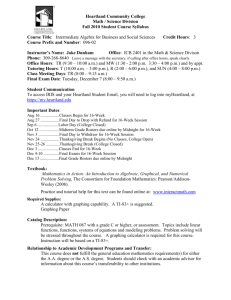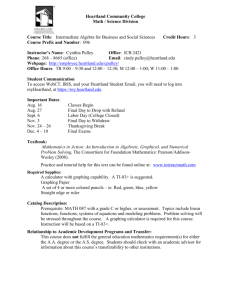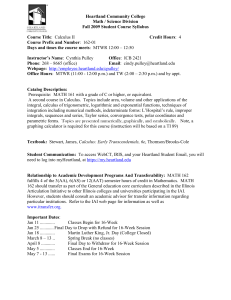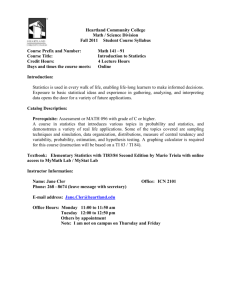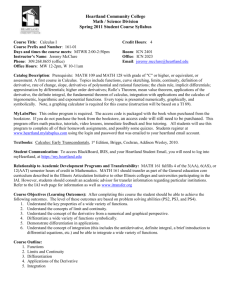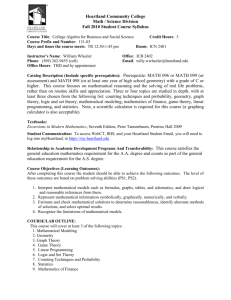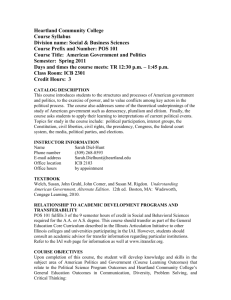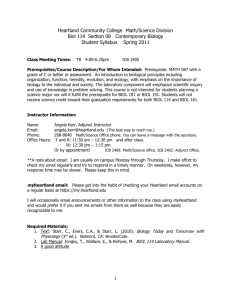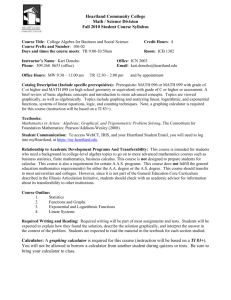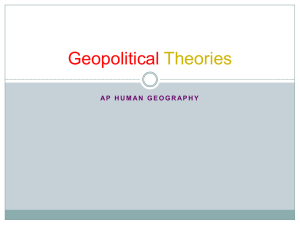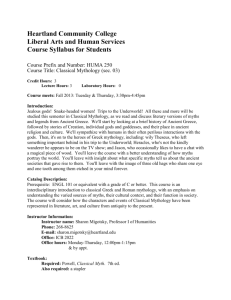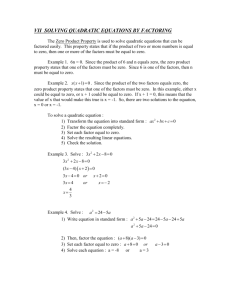Math 096-12 Dunham
advertisement
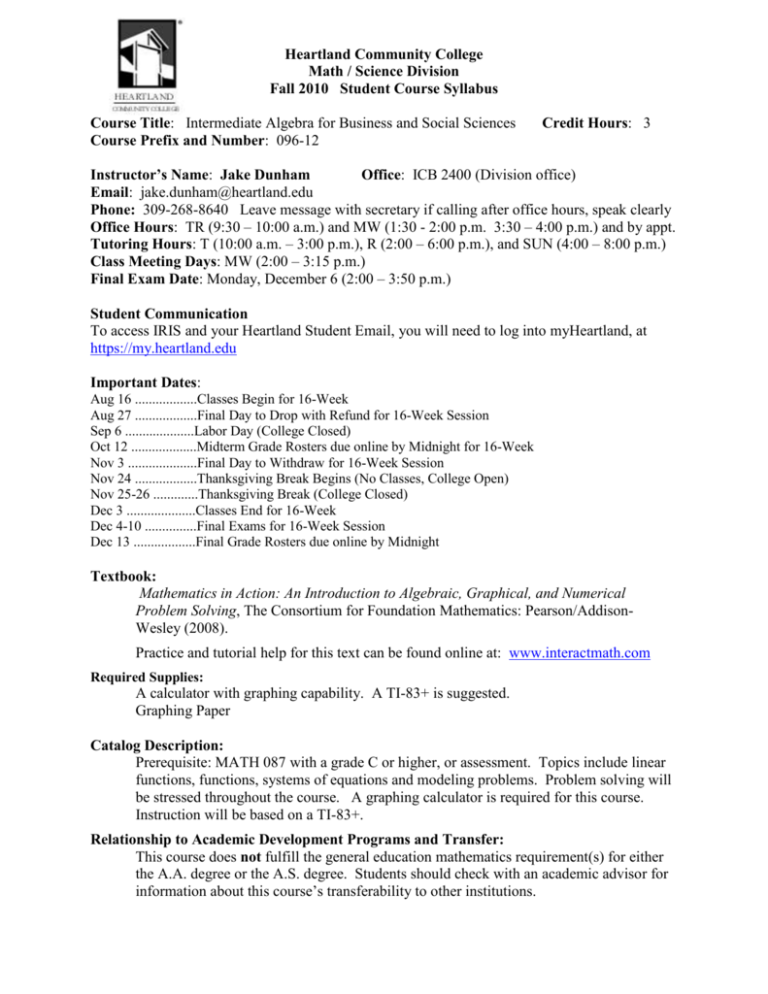
Heartland Community College Math / Science Division Fall 2010 Student Course Syllabus Course Title: Intermediate Algebra for Business and Social Sciences Course Prefix and Number: 096-12 Credit Hours: 3 Instructor’s Name: Jake Dunham Office: ICB 2400 (Division office) Email: jake.dunham@heartland.edu Phone: 309-268-8640 Leave message with secretary if calling after office hours, speak clearly Office Hours: TR (9:30 – 10:00 a.m.) and MW (1:30 - 2:00 p.m. 3:30 – 4:00 p.m.) and by appt. Tutoring Hours: T (10:00 a.m. – 3:00 p.m.), R (2:00 – 6:00 p.m.), and SUN (4:00 – 8:00 p.m.) Class Meeting Days: MW (2:00 – 3:15 p.m.) Final Exam Date: Monday, December 6 (2:00 – 3:50 p.m.) Student Communication To access IRIS and your Heartland Student Email, you will need to log into myHeartland, at https://my.heartland.edu Important Dates: Aug 16 ..................Classes Begin for 16-Week Aug 27 ..................Final Day to Drop with Refund for 16-Week Session Sep 6 ....................Labor Day (College Closed) Oct 12 ...................Midterm Grade Rosters due online by Midnight for 16-Week Nov 3 ....................Final Day to Withdraw for 16-Week Session Nov 24 ..................Thanksgiving Break Begins (No Classes, College Open) Nov 25-26 .............Thanksgiving Break (College Closed) Dec 3 ....................Classes End for 16-Week Dec 4-10 ...............Final Exams for 16-Week Session Dec 13 ..................Final Grade Rosters due online by Midnight Textbook: Mathematics in Action: An Introduction to Algebraic, Graphical, and Numerical Problem Solving, The Consortium for Foundation Mathematics: Pearson/AddisonWesley (2008). Practice and tutorial help for this text can be found online at: www.interactmath.com Required Supplies: A calculator with graphing capability. A TI-83+ is suggested. Graphing Paper Catalog Description: Prerequisite: MATH 087 with a grade C or higher, or assessment. Topics include linear functions, functions, systems of equations and modeling problems. Problem solving will be stressed throughout the course. A graphing calculator is required for this course. Instruction will be based on a TI-83+. Relationship to Academic Development Programs and Transfer: This course does not fulfill the general education mathematics requirement(s) for either the A.A. degree or the A.S. degree. Students should check with an academic advisor for information about this course’s transferability to other institutions. Course Outline: 1. Functions 2. Linear Models 3. Systems of Equations 4. Nonlinear Models (Quadratic and Exponential) Learning Outcomes Understand the meaning of a function and function notation. Find and understand the domain and range of a function. Find and understand intercepts and their meaning in a context. Solve linear equations and explain the meaning of the solution in context. Create a scatter plot from data. Find and understand the domain, range and intercepts of a linear function. Find the slope of a linear function and explain its meaning in a context. Graph a linear function by hand. Find a linear model from numerical data using algebra, from numerical data using regression, and from a graph. Identify the solutions of a system of equations using a graph and numerical methods. Explain the meaning of a solution to a system of equations in a context. Recognize dependent and inconsistent systems of equations. Solve a system of equations using the substitution and elimination methods. Graph a system of linear inequalities. Recognize a quadratic function from its graph, equation or a table of values. Identify the vertex of a parabola and explain its meaning in a context. Graph quadratic functions. Find and use a quadratic model when appropriate. Find and understand the domain, range, and intercepts of a quadratic function. Solve a quadratic equation by factoring and quadratic formula. Method of Evaluation (Tests/Exams, Grading System): Student grades are based on successful completion of homework, quizzes, tests and other assignments. Your grade is based upon cumulative total points. There is no weighting of grades for quizzes or exams, but these will be worth more points than your assignments. Exams may include comprehensive material and you will have a comprehensive final. You will have 4 exams throughout the semester each worth 15% of your final grade. Weekly quizzes will constitute 10% and homework 10% of your final grade. Your final exam will be worth approximately 20% of your final grade in this course. Grade Scale: 100 - 90% A 89 – 80% B 79 – 70% C 69 – 60% D Late work policy: There are NO make-ups for exams, quizzes or assignments. 59 -0% F Breakdown of Points: Exam 1 Exam 2 Exam 3 Exam 4 Quizzes Homework Final Exam Total 150 pts 150 pts 150 pts 150 pts 100 pts 100 pts 200 pts 1000 pts Participation (or Attendance): Regular attendance is necessary to be successful in this class. If a student is absent, it is his/her responsibility to obtain any class notes and assignments that they missed. Course Philosophy: Student Learning: The present and future workplace has (and will have) an increased emphasis on flexibility and adaptability to changes in technology, problem solving, critical thinking and the ability to work cooperatively in groups. To this end, we will stress the following skills in addition to the mathematical content of the course: You will define those skills needed to solve problems presented to you. You will construct a step-by-step approach to solving the problem. You will render a cogent explanation, understandable to other students of approximately the same math level, of the purpose of each step that was taken toward the result. You will justify your problem solving strategy. You will develop self- and peer-assessment skills. You will function collaboratively within a group to the end of developing deeper understanding of problem solving techniques. Instructor’s Role: The instructor’s role in the education process is to: Deliver course content. Aid the students by creating a positive learning environment where students feel free to ask questions, feel free to learn from mistakes, and are encouraged to develop their curiosity. Help the students develop problem solving skills. Provide guidance to students in discovering concepts and solutions themselves. Some of my objectives in this course will be to: Assist your group in achieving the objectives of the individual lessons and the course – primarily through the use of questioning. Promote discussion within each group and with the entire class - primarily through the use of questioning. Clarify your understanding and increase your ability to communicate that understanding – primarily through class discussion and written assignments. Model the deductive reasoning necessary for the construction of understanding in mathematics. Student Evaluations In the last 3 – 4 weeks of class, all students are expected to complete a course evaluation form online, at www.studentevals.com/heartland. Student Conduct, Academic Integrity, Plagiarism, Incompletes: Please refer to the Student Services section in the Heartland Community College Catalog for specific policies concerning discipline, academic integrity, plagiarism and incompletes. Heartland Library Information http://www.heartland.edu/library The Library, located in the Students Commons Buildings at the Raab Road campus, provides Heartland students with a full range of resources including books, online journal databases, videos, newspapers, periodicals, reserves, and interlibrary loan. Librarians are available to assist in locating information. Tutoring Center: Testing Center: http://www.heartland.edu/asc/tutor.html http://www.heartland.edu/asc/testing.html (309) 268-8231 (309) 268-8231 Academic Disabilities If you have a documented disability and wish to discuss academic accommodations, please contact Anita Moore at 268-8249 or anita.moore@heartland.edu. Notice of Cancelled Class Sessions Cancelled class sessions, for all HCC classes, will be listed under Cancelled Class Meetings on the HCC Web site. Go to http://www.heartland.edu/classCancellations/ to learn what classes have been cancelled for that day and the upcoming week. Be sure to check the last column, which might contain a message from the instructor. Syllabus Disclaimer: This syllabus is subject to change. Any changes will be announced in class. Tentative Day to Day schedule: Date M 8-16 W M 8-23 W M 8-30 W M 9-6 W M 9-13 W M 9-20 W M 9-27 W M 10-4 W M 10-11 W Section covered Act 1.2, 1.4 Act 1.6, 1.8 Act 1.9, 1.10 Act 1.11, 1.12 Exam 1 Act 2.1, 2.2 Labor Day (No Class) Act 2.3, 2.4 Act 2.5, 2.7 Act 2.9, 2.11 Act 2.12, 2.13 Act 2.17 Exam 2 Act 3.1, 3.2 Act 3.3, 3.4 Act 3.5, 3.6 Act 3.7, 3.8 Date M 10-18 W M 10-25 W M 11-1 W M 11-8 W M 11-15 W M 11-22 W M 11-29 W M 12-6 W M 12-13 Section covered Act 3.9, 3.10 Act 3.11, 3.12 Act 3.13, 3.14 Exam 3 Act 4.1, 4.2 Act 4.3, 4.4 Act 4.5, 4.6 Act 4.7, 4.8 Exam 4 Thanksgiving Review Final Exam Final Grades Due in IRIS by Midnight
